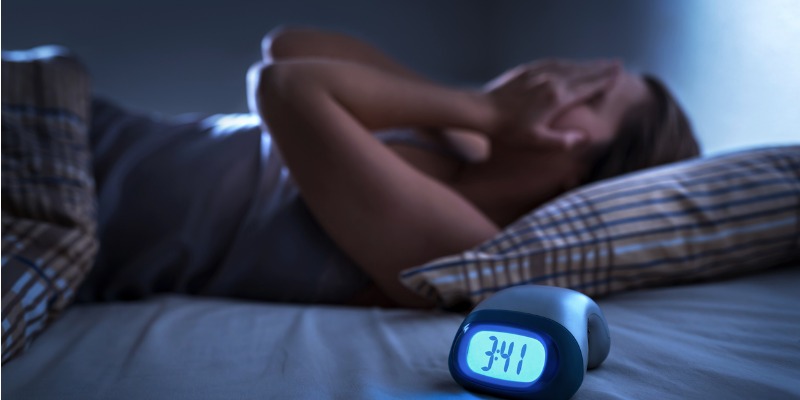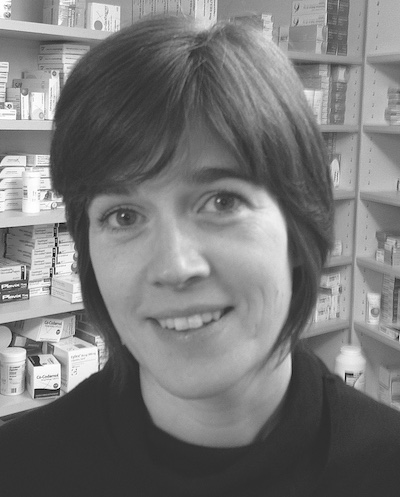Wake up to sleep matters
In OTC
Follow this topic
Bookmark
Record learning outcomes
 A third of us struggle with sleep and more than 80 per cent of us experienced stress last year, which makes it a category pharmacy can’t afford to ignore. Sarah Purcell looks at the latest advice for treating insomnia and helping customers cope with stress
A third of us struggle with sleep and more than 80 per cent of us experienced stress last year, which makes it a category pharmacy can’t afford to ignore. Sarah Purcell looks at the latest advice for treating insomnia and helping customers cope with stress
One in three of us in the UK regularly gets a poor night’s sleep, according to surveys by The Sleep Council and YouGov, while up to three-quarters of adults often don’t get at least seven hours’ sleep a night.
Long-term lack of sleep is associated with increased risk of obesity, stroke, heart disease, depression and anxiety. Stress is widespread in our society – 86 per cent of us say we’ve experienced it in the past year, according to Mintel.
“Factors that affect our sleep include busy lifestyles, working longer hours, shift work, increased workload and long commutes,” says sleep expert Dr Neil Stanley. “This is particularly because we are increasingly unable to separate work and home life. For many, there is no ‘off’ button. Sleep and mental health are closely connected. Sleep disturbance or deprivation increases the risk of developing mental health issues.”
There is increased awareness now around the importance of sleep. “We’re focusing on it much more,” says Jacqui Lee, information pharmacist at Numark. “There is also much more discussion in the media, which is increasing awareness of stress and the effect it has on our lives. This awareness is likely to help drive customers to pharmacy for advice and support without the need to book an appointment.”
“One in three people suffers from lack of sleep in the UK and we know more than half of them are not treating the problem,” says Lucy Wingrove, senior brand manager, wellness at Perrigo UK. “This is due to their lack of knowledge around sleep aids and how these can help them. In recent years the NHS has been highlighting the importance of sleep for good mental wellbeing and remarking how good sleep, like a healthy diet and exercise, can improve mental health. This is why it is important for pharmacists to be aware of such trends, to be able to recommend the best course of action for patients.”
What is insomnia?
Doctors divide insomnia into primary and secondary types. Primary insomnia – with no underlying illness or cause – accounts for one in five long-term cases. Secondary insomnia is when poor sleep is caused by factors including physical illness, mental health conditions, a sleep disorder such as sleep apnoea, substance misuse, medication or stress. Insomnia of one to four weeks is classed as short-term.
Some 10 to 15 per cent of adults have long-term insomnia and 25 per cent of older people are affected. Insomnia is 1.5 to two times more common in women and half of all diagnosed cases of insomnia are related to a mental health problem.“Insomnia is the most commonly reported mental health complaint in the UK,” says clinical psychologist and member of the British Sleep Society Dr Gabriella Romano (sleeppsychologist.co.uk).
Improve your sleep category
-
Place a stronger emphasis on sleep as a category and have greater in-store visibility. Typically, sleep aids are hidden away on lower shelves, so merchandise them better to make them more prominent in the pharmacy
-
Create a dedicated sleep health section alongside other relaxation and wellness remedies and products to enable a broader lifestyle approach when it comes to addressing sleep and sleep habits
-
Capitalise on wellness events and dates throughout the calendar year, including mental health and stress awareness, as well as sleep-specific ones.
“It can be triggered by a significant life event, for example a bereavement. Some of us are good at overcoming these episodes and restore sleep fairly quickly. However, others develop cycles of poor sleep, unhelpful patterns of thoughts and behaviours. People with insomnia will often report feeling tired and wired. Unlike sleep deprivation, insomnia is not getting enough quality and quantity of sleep despite adequate opportunity.”
How do you know if your customer has insomnia? “People with insomnia will complain about having poor quality sleep, with symptoms that include not being able to get to sleep, waking up in the middle of the night and not being able to get back to sleep and/or waking too early,” says Dr Romano. “These symptoms can occur a minimum of three times a week and continue for many weeks or months.”
If your customer is referred to their GP for insomnia, they may be prescribed a short course of hypnotic drugs: either short-acting benzodiazepines or one of the Z drugs (zoplicone, zolpidem or zaleplon). These shouldn’t be taken for longer than two weeks. Melatonin may be prescribed for long-term insomnia in older people for up to 10 weeks.
Sedating antihistamines, which can be recommended OTC, include diphenhydramine, promethazine and hydroxyzine. Short-term only use (seven to 14 days) is recommended as there is the potential for misuse. “OTC sleep aids can become habit forming because the person can convince themselves that they can only sleep with the pill, which may lead them to use the drug long-term, even if it has little or no pharmacological effect,” says Dr Stanley. Popular herbal remedies include valerian, hops and passiflora, although there is little clinical evidence for their efficacy.
Your customer’s GP or sleep clinic can recommend CBT-I (cognitive behavioural therapy for insomnia) for long-term insomnia. “This treatment has shown an 80 per cent success rate,” says Dr Romano. “It is not just made up of sleep hygiene, but a series of therapeutic components that challenge unhelpful thoughts and behaviours that perpetuate insomnia. This is delivered often over a five-week period by a trained professional in behavioural sleep medicine.”
Digital aids may be helpful to recommend to your customers. There are lots of sleep apps that may be useful. Across the South East, NHS patients are piloting the Sleepio app, developed by sleep expert Colin Espie. The app uses CBT techniques and sleep tracking to help people with persistent insomnia.
Medicines that can disrupt sleep
When looking at why a customer is experiencing insomnia, it’s worth checking to see whether any medication they are taking could have an effect. Here are the common culprits.
- Antidepressants, especially SSRIs such as citalopram, fluoxetine, sertraline, venlafaxine and duloxetine. Antidepressants that may aid sleep include mirtazapine and trazodone
- Epilepsy drugs, including phenytoin, ethosuximide, topiramate, gabapentin and pregabalin
- Beta-blockers, especially water-soluble formulations such as atenolol, celiprolol hydrochloride, nadolol and sotalol hydrochloride
- Steroids such as prednisolone and dexamethasone. Sleep disturbance is most common with tablets. This can be minimised by taking them in the morning
- Opioids used for chronic pain relief
- Asthma drugs including salbutamol, salmeterol and theophylline
- Analgesics that contain caffeine
- Cold and flu relief remedies, such as those containing pseudoephedrine.
“Pharmacy staff may need to signpost customers back to their GP if they are taking a prescribed medication, but for OTC treatments such as cold remedies and painkillers, they could recommend taking the last dose of the day no later than about 6pm to limit its effect on sleep,” says Ms Lee.
Sleep and stress aids market
According to IRI data, the sleeping aids and stress market in the UK is worth £56 million (July 2019). Pharmacy products are worth £23.9m, herbal products £13.3m, stress relief products £12.5m and anti-snoring products £6.6m.
“People are looking for a sleep aid that doesn’t create addiction and won’t make them feel groggy the day after,” says Ms Wingrove. “Safety is the key attribute they look for.”
Stephanie Daines, brand manager for Rescue Remedy, says about two-thirds of consumers prefer natural products because of they are worried about dependency and side effects. “Consumer insights show that concerns about side effects, particularly for use during the week and with new mums, are the biggest questions asked when considering stress or sleep products,” she says. “Pharmacists are in a great position to provide advice on realistic ways to manage stress, including educating consumers on the link between stress and sleeplessness.”
The British Association for Psychopharmacology says new data from a Swiss study published in the Journal of Psychiatric Research shows that 98.4 per cent of people saw an improvement in anxiety related sleep disturbances when taking a daily capsule of pharmaceutical quality lavender oil vs placebo, with more than 15 clinical trials showing that a daily lavender oil capsule can be as effective as lorazepam prescribed in generalised anxiety disorder, but without the risk of sedation, dependency or withdrawal.
Anne-Sophie Louvet, UK head of marketing at Puressential, also notes a trend towards natural products for stress and insomnia. “If you want to stock natural solutions, look at those with science and trials behind the product so you are confident recommending it,” she says.
Cathy Crossthwaite, marketing co-ordinator at Numark, suggests the following tips to maximise your category:
- Ensure sleep and stress categories are well advertised and easy to navigate
- Use visual cues of leading brands to help customers locate and navigate the category, but also use signage. Although some products are behind the counter, it’s still important for customers to be able to see the range to encourage them to speak to a member of staff
- There can be some nervousness around taking medication to aid sleep, so be aware that customers may want to speak to staff about availability of alternative remedies.
“Typically, sleep aids are hidden away, so merchandise them better to make them more prominent,” says Ms Wingrove. “Place them alongside other relaxation and wellness remedies to enable a broader approach when it comes to addressing sleep. Use brand resources and training aids.”
Coping with stress
Some 86 per cent of adults reported experiencing stress in the past year, says Mintel (Managing Stress And Wellbeing report). Money is the top cause, followed by work, physical health problems, relationships and mental health issues. Yet only 15 per cent spoke to a professional for advice. Some 54 per cent who have experienced stress in the past year have also had difficulty sleeping.
When speaking to customers, it’s important to distinguish between stress and anxiety. “A simple way to understand this is that stress is a response to a threat in a situation, whereas anxiety is a response to the stress,” says a spokesperson from the Mental Health Foundation. “Stress is a body state – the body preparing itself for fight or flight – and anxiety is a more long-term pattern of thinking, feeling and behaving. Stress is part of anxiety, but not necessarily the other way round. For example, many people experience stress around public speaking and might notice changes in their body. That’s their body getting ready to run away from or attack a potential threat. Anxiety would include that physical state, as well as unhelpful thoughts and behaviours such as avoiding speaking in front of people.”
“Stress isn’t a mental health problem, but excessive, unmanageable stress can affect your physical and mental health,” says Stephen Buckley, head of information at mental health charity Mind. “Stress can lead to developing mental health problems or make existing problems worse and living with mental health problems can cause stress.
“If a customer is experiencing unmanageable stress and it’s affecting their mental health and daily life, encourage them to speak to their GP, who can talk them through the support available.” Mind has a guide on how to speak to their GP about mental health for the first time at mind.org.uk/findthewords.
Signs and strategies
When feeling stressed, people behave differently from usual. They may become withdrawn, indecisive, irritable or tearful. Sleep is often affected. Some people may smoke more, drink more or take drugs. Customers may complain of headaches, nausea or indigestion. IBS has been linked to long-term stress, as have ulcers and cardiovascular disease.
Coping strategies to recommend include:
- Learn to recognise the warning signs of stress, then look for possible causes. These can then be divided into: those with a practical solution, those that will sort themselves out, and those that are beyond control
- Review your lifestyle. Delegate tasks where possible and prioritise
- Eat healthily
- Reduce alcohol and caffeine
- Exercise every day
- Take time out for yourself
- Learn to use mindfulness meditation, which has been proven to help reduce stress and anxiety
- Take steps to improve sleep.
Brand news
Rescue Remedy’s Tune Into Your Inner Positive campaign launches this month. The campaign, which will focus on the link between stress and sleep, will feature across the London tube and rail network.
Nytol are supporting their liquid diphenhydramine formula launch with a Good Sleep Matters training guide and counter top tool to encourage quality discussions on sleep. Point of sale materials are being distributed to pharmacies.
P3pharmacy Category Panel View
 Fiona McElrea, Whithorn Pharmacy, Dumfries & Galloway
Fiona McElrea, Whithorn Pharmacy, Dumfries & Galloway
“We sell a lot of aids for insomnia and stress. We also offer customers counselling and advice on sleep. We do get a percentage of customers who abuse sleep aids and they may need a referral to their GP. Common queries are: why can’t I get to sleep? Why do I wake so early and can’t get back to sleep? Often it may be related to shift work. For insomnia, the most popular brand is Nytol. For stress, it’s Kalms and Bach Remedies. It’s not a category I feel we should actively promote because of the danger of misuse.”
 Sarina Mughal, Day Lewis, London SW1
Sarina Mughal, Day Lewis, London SW1
“We have lots of customers with demanding jobs. They want supplements rather than medicinal products to help them relax and to sleep better. We stock lots of herbal remedies, and CBD products are now incredibly popular – we’ve seen huge growth in this market. Nytol and Nytol Herbal are also popular for insomnia. We get a lot of queries about melatonin, as we have many international customers who are used to being able to buy this over the counter. It’s important to place herbal products next to the medicinal ones to give customers a choice.”
 Yasmeen Afsar, Well Pharmacy, Hartlepool
Yasmeen Afsar, Well Pharmacy, Hartlepool
“With today’s modern lifestyles, insomnia and stress are common. Typical requests are for sleeping aids, both herbal and medicated, and many customers want advice on sleep hygiene. Phenergan Night Time, Nytol One-A-Night and Sominex, all sell well, followed by Nytol herbal tablets. The Rescue Remedy range is popular for short-term stress symptoms. Medicated sleep aids are kept behind the counter, so it’s a good idea to keep dummy boxes within the store to allow customers to access products they feel would be beneficial to them.”
